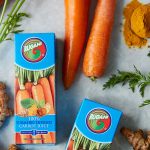Your Health from the Inside & Out
Have you ever wondered how your immune system functions and how you can support it? Health is top of mind for many people at the moment and nutrition plays an important role in supporting and maintaining proper immune function.[1] According to the World Health Organization: “A healthy lifestyle makes all bodily functions work better, including our immunity”.
What is our ‘immune system’?
Think of it as your body’s personal army.
The immune system typically has two reactions. One works on our body’s natural barriers against disease-causing intruders, like our skin, mucous, the hairs in our nose and the acid in our stomachs, these all form part of our ‘innate’ immune system. Our ‘adaptive’ immunity, on the other hand, develops over a lifetime of contact with bugs – including viruses and bacteria, and vaccines, preparations which help our immune systems to distinguish friend from foe. Our immune systems do a remarkable job at fighting off foreign cells to protect us against illness.
FUELLING Right
The good-gut-guys
We live in a symbiotic relationship with our gut bacteria. Having the right ones around, that we evolved with; is best for our health. Anything we do that alters that can be detrimental. Not only do our microbes form protective barriers, but they also programme our immune systems. Older people, and those with diseases that are characterised by inflammation, such as asthma, heart disease and diabetes, tend to have less varied gut microbiomes.
To feed our gut flora, we need to eat a more varied diet including lots of high-fibre foods. In a nutshell, the more plant foods you consume, the better. The microbiome really likes fibre (think fruit and vegetables), legumes and pulses and fermented foods. Kefir, yoghurt and pickles such as sauerkraut and kimchi are among the fermented delicacies now fashionable thanks to our increasing knowledge of the microbiome.
Eat the rainbow of colours!
Fruit and vegetables are rich dietary sources of various immune-protective substances such as fibre, folate, vitamins like C and D, as well as non-nutrient phytochemicals, including carotenoids and flavonoids, such as beta-carotene, anthocyanins, flavanols, and flavanones. These substances are needed for the optimal functioning of the immune system.
The easiest way to ensure you’re getting these immune-protective substances is to consume a wide variety of different seasonal fruit and vegetables. Fill your trolley with plant foods that are rich in antioxidants and have immune-supporting powers, including citrus fruits, carrots, cabbage, broccoli, pumpkin, sweet potato, and spinach. Aim for at least 5 servings a day.
Researchers in Northern Ireland randomly assigned 83 healthy volunteers aged 65 to 85 to eat a diet averaging two servings of fruits and veggies, or to include at least five servings of fruits and vegetables daily. After 16 weeks, the fruit-and-vegetable group had a better immune response than the people who didn’t up their produce intake. Concluding that emphasizing fruits and veggies appears to be beneficial to supporting immunity.
Spice it up!
Rather flavour food naturally with herbs & spices, such as garlic, onion, turmeric, ginger and cinnamon. Many of these herbs and spices have potent anti-microbial, anti-inflammatory and immune benefitting properties.
You have the POWER
Eat regularly, emphasize fruits and veggies, stay hydrated, no smoking, moving daily, get some sunlight and enough sleep, a winning combination to help maintain and support a well-functioning immune system!
 Author Bio:
Author Bio:
Megan has a love and passion for food and evidence-based information. She owns her own Nutrition Consultancy since 2000, where she consults both hospital and private clients, consults on medico-legal cases, various health issues, sports nutrition, speaks at schools, has published numerous articles, a recipe book and performs food demonstrations. She also consults to various Food Industry clients both locally and internationally, including assistance on legislative matters and food labeling.
Megan is the consulting dietitian for the Cancer Association of South Africa (CANSA) since 2006, now assisting with the CANSA Seal of Recognition Program and recently with ‘food parcel’ criteria.
Her work also entails regular television appearances, radio interviews and writes articles for the lay press, writes advertorials and publishes in scientific publications, as well as contributes to chapters in books on various health matters. Megan lectures and is an external examiner and assessor at various academic institutions.
She was the National President and also served on the Association for Dietetics in South Africa (ADSA) branch and Executive Committees for over 14 years. Megan has been made an Honorary member of ADSA.
In 2016, Megan started ‘Buddies for Fur & Feathers’ with a group of like-minded friends where they assist in fundraising, networking, partnering and supporting animal organizations with various projects, including helping to fulfil some of their wish lists and offering much needed assistance to people and animals in the community.
A love for nature and the outdoors, Megan hikes and runs, she has submitted Mt Kilimanjaro and ran her first two overseas marathons at the end of October last year.
Her qualifications include:
- Registered Dietitian (Free State University)
- Masters in Nutrition (Stellenbosch University)
- Diploma in Therapeutic Aromatherapy (AHPCSA)
- Postgraduate Diploma in Marketing Management (UNISA)
- Internationally qualified Chef de Pâtisserie (City & Guilds), passed cum laude
References
https://nutrition.org/the-role-of-nutrition-in-supporting-the-immune-system-relative-to-coronavirus-covid-19/
http://www.emro.who.int/nutrition/nutrition-infocus/nutrition-advice-for-adults-during-the-covid-19-outbreak.html
https://www.weforum.org/agenda/2020/04/immune-system-fight-off-disease-coronavirus-covid19-pandemic/
https://www.euronews.com/living/2020/04/23/how-can-you-boost-your-immune-system-during-the-covid-19-pandemic
https://www.todaysdietitian.com/news/exclusive0915.shtml
https://www.theguardian.com/lifeandstyle/2020/mar/08/how-to-boost-your-immune-system-to-avoid-colds-and-coronavirus
https://dietitianapproved.com.au/nutritionandimmunity/
Burke, L. & Deakin, V. (2015). Clinical Sports Nutrition (5th ed.). North Ryde, NSW: McGraw-Hill.
https://www.ncbi.nlm.nih.gov/pmc/articles/PMC7019735/pdf/nutrients-12-00236.pdf
Hosseini B, Berthon BS, Saedisomeolia A, Starkey MR, Collison A, Wark P, and Wood LG. Effects of fruit and vegetable consumption on inflammatory biomarkers and immune cell populations: a systematic literature review and meta-analysis. Am J Clin Nutr 2018; 108: 136–155.
https://www.todaysdietitian.com/newarchives/011209p48.shtml
https://dieteticdirections.com/five-scientifically-proven-ways-to-boost-immunity/
Hosseini B, Berthon BS, Saedisomeolia A, Starkey MR, Collison A, Wark P, and Wood LG. Effects of fruit and vegetable consumption on inflammatory biomarkers and immune cell populations: a systematic literature review and meta-analysis. Am J Clin Nutr 2018; 108: 136–155.
https://eatrightvirginia.org/nutrition-immune-health/
https://www.wcrf.org/int/blog/articles/2020/04/links-between-coronavirus-nutrition-and-immune-system
https://www.bda.uk.com/resource/healthy-eating.html
https://dieteticdirections.com/five-scientifically-proven-ways-to-boost-immunity/
https://www.wcrf.org/int/blog/articles/2020/04/links-between-coronavirus-nutrition-and-immune-system




